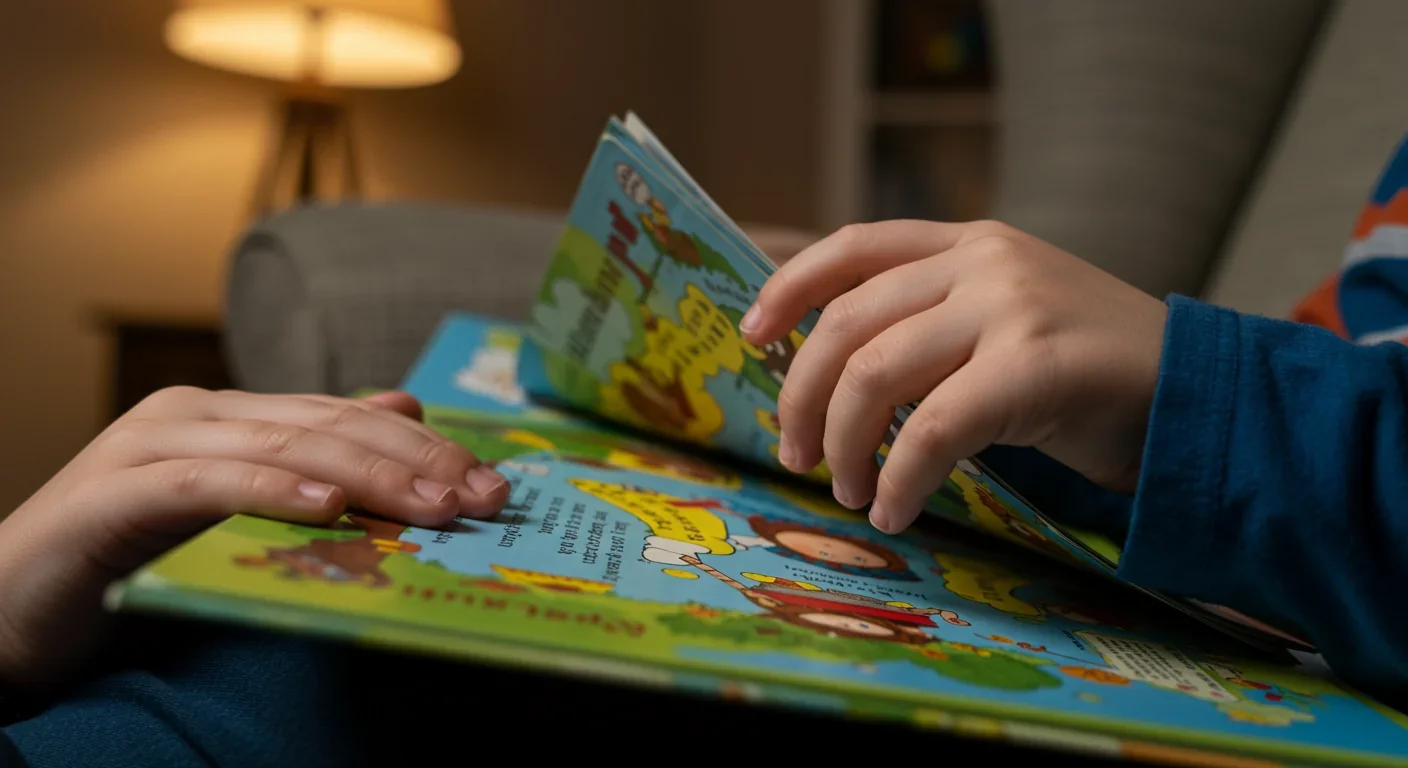Why We Pick Sides Over Nothing: Instant Tribalism Science

TL;DR: Your vocabulary reveals far more than communication ability - it broadcasts your social class, education level, and access to resources. Drawing on costly signaling theory, this analysis shows how sophisticated word choices function as reliable class markers precisely because they're expensive to acquire, requiring years of education and enriched language exposure that create a 30-million-word gap by age three.
Why do we still use words like "utilize" when "use" works just fine? Why does saying "I seen it" versus "I saw it" trigger instant judgments? The answer lies in a surprising place: evolutionary biology's theory of costly signaling. Your vocabulary isn't just how you communicate - it's an expensive broadcast of where you came from, how much education you've had, and which social circles you belong to.
By age three, children from high-income families have heard 30 million more words than their lower-income peers. This isn't just about quantity. Those 30 million words create a cascade that shapes everything from academic performance to career prospects to lifetime earnings. Vocabulary functions as what biologists call a costly signal - like a peacock's tail, it's hard to fake and expensive to acquire, which is precisely what makes it a reliable indicator of social status.

In nature, costly signals solve a fundamental problem: how do you prove you're not lying? A peacock growing an enormous, impractical tail demonstrates genuine fitness because only a truly healthy bird can afford the metabolic cost. The principle, called the handicap principle, ensures honesty through expense.
Human vocabulary works the same way. Acquiring sophisticated words requires years of education, countless hours of reading, exposure to specific social environments, and sustained cognitive investment. You can't fake it with a quick vocabulary list. Research shows only a modest correlation (r = 0.24) between vocabulary learning strategies and actual vocabulary knowledge - meaning that even when people actively try to build their vocabulary, success requires something more than technique. It requires time, resources, and consistent exposure to enriched language environments.
This makes vocabulary a near-perfect class marker. The signal is reliable because the investment is real.
When someone effortlessly uses words like "juxtaposition," "epistemological," or "orthogonal," they're signaling thousands of hours spent in classrooms, libraries, and conversations with educated speakers. The signal is reliable because the investment is real.
Hart and Risley's famous 30-million-word gap study revealed something stark: by kindergarten, children's vocabulary sizes already correlate strongly with their parents' socioeconomic status. High-income children enter school knowing roughly twice as many words as low-income children. This early divergence compounds over time.
The mechanism is straightforward but brutal. Learning 1,000 new words increases academic performance, and academic performance opens doors to better schools, more challenging coursework, and peer groups that reinforce sophisticated language use. Meanwhile, kids who start behind face an uphill battle. They're not just learning new words - they're trying to close a gap that widens with each passing year.
Adults fare no better at rapid catch-up. Even in enriched environments, adults typically add only 4,000 words per year. Compare that to the 13,000-word receptive vocabulary the average American adult maintains, with about 7,000 in active use. Bridging a childhood deficit takes years of sustained, deliberate effort - exactly the kind of investment most people from disadvantaged backgrounds can't afford while also working, raising families, and managing daily survival.

Not all words carry equal weight. Sociolinguistic research consistently finds that "prestige varieties" of language - typically the forms used by socially dominant groups - receive institutional backing. In Britain, Received Pronunciation remains the gold standard. In the United States, "Standard American English" occupies the same position.
These prestige forms aren't inherently better or more logical. They're prestigious because powerful people use them. But once established, they become self-reinforcing. Schools teach them. Workplaces demand them. Media normalizes them. Anyone who wants upward mobility must acquire them.
"The social markers associated with speech, along with other forms of social capital, are among the hardest to acquire."
- Sociolinguistic research on language acquisition
The acquisition process is costly. Speech patterns absorbed in early childhood are "among the hardest to acquire" later in life. Changing your vocabulary, grammar, and accent requires not just learning new forms but suppressing deeply ingrained habits. It's cognitive overhead that privileged speakers never have to bear.
This creates what Pierre Bourdieu called linguistic capital - a form of cultural capital that predicts social position. Just as financial capital generates returns, linguistic capital opens doors. Studies from South Korea show that English proficiency directly increases competitiveness in employment and promotion. Research on Canadian immigrants found that learning English was essential for integration and perceived competence, while French knowledge held less economic value in their context.
Your words literally predict your earnings. Studies suggest a direct correlation between vocabulary size and salary. The more sophisticated your word choice, the higher your likely income - not because fancy words make you smarter, but because vocabulary signals the educational and social investments that lead to higher-paying opportunities.

Walk into a job interview saying "I seen the report" instead of "I saw the report," and watch opportunities evaporate. Use "irregardless" in a professional email. End sentences with prepositions in academic writing. These aren't communication failures - the meaning comes through just fine - but they are class markers that trigger immediate judgments.
This is gatekeeping disguised as standards. When hiring managers favor candidates with "strong communication skills," they often mean candidates whose language matches their own class background. Research on accent bias shows that workplace discrimination based on speech patterns affects career trajectories and social mobility. A 2020 survey found that certain accents significantly influence hiring decisions, with prestige accents receiving preferential treatment.
The cruelty is that these markers are arbitrary. "I saw" isn't grammatically superior to "I seen" in any linguistic sense - both convey past tense effectively. But one signals formal education, the other doesn't. In many dialects, "I seen" follows perfectly logical rules. But those rules aren't the prestige rules, so speakers get penalized.
William Labov's groundbreaking work in 1960s New York demonstrated this powerfully. He found that higher social classes pronounced the post-vocalic /r/ in words like "fourth floor" more frequently than lower-class speakers. There's no functional reason for this - the /r/ doesn't aid comprehension - but it became a class marker nonetheless, and remains one today.
Language becomes a tool of institutional power. Schools penalize students for "incorrect" usage that simply reflects their home dialect. Workplaces demand "professional" communication that excludes working-class speech patterns.
Language becomes a tool of institutional power. Schools penalize students for "incorrect" usage that simply reflects their home dialect. Workplaces demand "professional" communication that excludes working-class speech patterns. Courts and government agencies operate in specialized registers that mystify outsiders. Each barrier reinforces existing hierarchies.
People who grow up speaking non-prestige dialects face a double burden. To succeed in mainstream institutions, they must master code-switching - the practice of shifting between language varieties depending on context.
In Pakistan, for instance, code-switching between English and Urdu is common among middle and upper classes, serving as a marker of education and social mobility. Elite speakers incorporate English words and phrases, reflecting their access to Western-style education. Those with higher education levels use formal Urdu and integrate English vocabulary, distinguishing themselves from speakers with limited educational backgrounds.

Code-switching isn't just linguistic flexibility - it's a performance of belonging to a socially valued group. But it extracts a cost. Constantly monitoring which words are appropriate for which audience, suppressing natural speech patterns, and maintaining dual linguistic systems creates cognitive overhead that privileged speakers never experience.
For multilingual learners, these challenges multiply. Studies show they face language barriers, cultural adjustment, and social integration challenges simultaneously while also trying to acquire the vocabulary and speech patterns necessary for academic and professional success. Many view education as a pathway to breaking economic hardship cycles, but the linguistic demands themselves become barriers.
The irony is sharp: the people who work hardest to learn prestige vocabulary are often judged most harshly when they slip up. Native speakers of prestige dialects can make errors without losing credibility. But for those who learned formal English as a second dialect or second language, a single mistake can undermine years of effort and reinforce stereotypes about their competence.
If simple words work fine, why do prestigious vocabularies stay complicated? Why not just say "use" instead of "utilize," "show" instead of "demonstrate," "help" instead of "facilitate"?
The answer returns to costly signaling. Signals must be expensive to remain reliable. If prestigious vocabulary became too easy to acquire, it would lose its signaling value. The complexity isn't a bug - it's the feature that makes the signal trustworthy.
Academic writing provides a clear example. Papers are often criticized for unnecessary jargon and convoluted phrasing. But that complexity serves a purpose beyond precision. It signals membership in the academic community. Mastering disciplinary vocabulary and citation practices requires years of training, making these forms reliable indicators of scholarly credibility.
"Only signals that are difficult to fake can reliably convey authentic status."
- Costly signaling theory research
Research on learning environments demonstrates this cost. Students in immersive single-language environments showed 90% higher vocabulary gains than those in mixed environments, but only after 10 months of daily exposure to 10 new words - a sustained investment that requires resources, time, and opportunity most people lack.

Professional jargon works similarly. Doctors use "myocardial infarction" instead of "heart attack," lawyers say "malfeasance" instead of "wrongdoing," and tech workers speak of "leveraging synergies" instead of "working together." Partly this adds precision. But it also excludes outsiders and reinforces professional boundaries. You can't fake fluency in these registers without genuine immersion in the field.
The persistence of complex vocabulary isn't about communication efficiency. It's about maintaining social boundaries. If everyone could easily acquire prestige vocabulary, it would cease to function as a class marker. The difficulty is the point.
Online communication is scrambling traditional language hierarchies in surprising ways. On one hand, the internet has massively expanded access to prestige vocabularies. Anyone can read the *New York Times*, watch TED talks, or take online courses from elite universities. Digital platforms theoretically democratize linguistic capital.
But in practice, new forms of linguistic gatekeeping have emerged. Internet culture spawns its own vocabulary - memes, slang, platform-specific terminology - that functions as costly signaling for tech-savviness and generational belonging. Sociolinguists note that digital platforms amplify accent and vocabulary visibility while creating new markers where certain slang or neologisms signal belonging to tech-savvy subcultures.
Text-based communication removes vocal markers like accent but amplifies written vocabulary differences. Online, your word choice is all anyone has to evaluate you. This can help people from non-prestige backgrounds who've invested in learning standard written English. But it can also make errors more salient. There's no voice or body language to soften the judgment when you confuse "your" and "you're" or use "literally" incorrectly.
Social media has also created what linguists call covert prestige - situations where non-standard varieties carry social benefits. Using Black English vernacular, regional slang, or intentional grammatical "errors" can signal authenticity, solidarity with non-elite groups, or cultural fluency. This complicates the traditional prestige hierarchy but doesn't eliminate it. These alternative prestige forms still require investment to master and still function as costly signals - just for different communities.
Perhaps most significantly, English dominates online communication, with 1.39 billion speakers globally and disproportionate usage on internet platforms. This amplifies English vocabulary as a global class marker. Non-native speakers face enormous pressure to acquire English proficiency for economic advancement, adding linguistic investment demands to everything else required for social mobility.
The uncomfortable truth is that your vocabulary at age five predicts much of your life trajectory. It predicts your reading comprehension, which predicts your school performance, which predicts your college options, which predict your career opportunities, which predict your lifetime earnings. All from the words you heard - or didn't hear - before kindergarten.
This isn't about intelligence or capability. It's about investment - not personal investment, but the investment a family and community can make in a child's linguistic development.
Cultural capital accumulates early. Children acquire language patterns from families and communities. Those raised in environments rich with books, complex conversations, and educated speakers build vocabularies that open doors. Those raised in environments where parents work multiple jobs, where books are scarce, where survival takes precedence over enrichment, fall behind before they can possibly understand what's happening.
This isn't about intelligence or capability. It's about investment - not personal investment, but the investment a family and community can make in a child's linguistic development. High-income families create rich vocabulary environments almost effortlessly. They read bedtime stories. They explain concepts in detailed ways. They use varied vocabulary in everyday conversation. They provide books, educational toys, and experiences that expose children to new words.
Low-income families often lack the time and resources for these investments. Parents working two jobs don't have hours for elaborate bedtime routines. Stressed households produce shorter, more directive communication. Books and educational materials cost money. The vocabulary gap isn't a failure of parenting - it's a predictable outcome of economic inequality.
And once established, the gap is brutally hard to close. Every year of schooling widens it. Children with large vocabularies encounter more complex texts, which teach more sophisticated words, which enable access to even more advanced materials. It's a compounding advantage. Meanwhile, children who start behind often receive simplified instruction designed for their current level, which keeps them at that level.
Social mobility research shows this pattern clearly. Higher education strongly correlates with increased social mobility, but quality education and resources vary wildly across socioeconomic backgrounds. The pipeline isn't equal-access - it's stratified from the start, with vocabulary differences serving as one of many mechanisms that reproduce class hierarchies across generations.
Understanding vocabulary as costly signaling reframes how we think about language "standards" and "correctness." These aren't natural laws or optimal communication systems. They're social conventions that happened to be codified by powerful groups, then enforced through institutions those groups control.
This doesn't mean vocabulary differences aren't real or that they don't matter. They absolutely matter - but not for the reasons we usually assume. "Incorrect" grammar doesn't indicate cognitive deficiency or careless thinking. It indicates different linguistic investments, different social networks, different educational opportunities. The person who says "I seen it" isn't confused about past tense. They've simply acquired a different, perfectly functional set of grammatical rules.
What makes prestige vocabulary prestigious is cost, not quality. The investment required to master it signals access to resources - time, education, stable environments, enriched language exposure. That signal becomes a gateway to opportunities because institutions use it as a screening mechanism, consciously or not.
Research confirms that signals must be difficult to fake to remain reliable indicators. Advanced vocabulary meets this criterion perfectly. You can't convincingly deploy sophisticated language without genuine, sustained exposure. Memorizing a few impressive words won't cut it. Native speakers detect awkward usage, register mismatches, and contextual errors immediately.
This is why vocabulary functions so effectively as a class barrier. It's not a single test you can study for. It's an entire linguistic system acquired over decades through immersion in specific social environments. By the time you're old enough to consciously work on it, you're already years behind those who absorbed it naturally.
If vocabulary functions as costly signaling, what can we do about the inequality it produces? Several interventions show promise, though none are simple fixes.
Early childhood programs that increase vocabulary exposure make a real difference. High-quality pre-K, parent coaching on language-rich interactions, and book distribution programs can narrow the word gap before it compounds. The challenge is funding and scaling these interventions to reach all children who would benefit.
Schools can adopt more inclusive language policies that value linguistic diversity rather than penalizing non-prestige dialects. This doesn't mean abandoning teaching of standard English - students need access to prestige varieties for social mobility. But it means framing these as additional tools rather than replacements for "incorrect" home languages. Students can learn code-switching as a skill without being made to feel their natural speech is deficient.
Higher education and professional workplaces can examine their linguistic gatekeeping practices. Do job descriptions really require "excellent communication skills," or do they require specific class-coded vocabularies? Can academic papers maintain rigor while reducing unnecessary jargon? These questions challenge deep-seated assumptions about what "professional" or "scholarly" language should sound like.
Digital resources democratize access to vocabulary enrichment - free audiobooks, online courses, writing communities where feedback flows both ways. The internet can help motivated individuals bridge gaps, though it can't replace the rich, consistent exposure that privileged children receive from birth.
Most fundamentally, we need to recognize linguistic prejudice for what it is: a mechanism that reproduces class hierarchies while pretending to measure merit. When we judge someone's intelligence or capability based on whether they say "I saw" or "I seen," we're not evaluating their communication effectiveness. We're enforcing class boundaries through language policing.
The vocabulary you use isn't just about words. It's about access, opportunity, and the expensive signals we use to sort people into social categories. Recognizing this doesn't eliminate inequality, but it's a start. Because once you understand that language differences mark investment rather than ability, you can't unsee it. Every conversation becomes a window into who had access to resources and who didn't. Every judgment about "proper" English becomes visible as the class barrier it always was.
Your words give you away - but they're revealing social structures, not personal deficiencies. That distinction might be the most important vocabulary lesson of all.

Ahuna Mons on dwarf planet Ceres is the solar system's only confirmed cryovolcano in the asteroid belt - a mountain made of ice and salt that erupted relatively recently. The discovery reveals that small worlds can retain subsurface oceans and geological activity far longer than expected, expanding the range of potentially habitable environments in our solar system.

Scientists discovered 24-hour protein rhythms in cells without DNA, revealing an ancient timekeeping mechanism that predates gene-based clocks by billions of years and exists across all life.

3D-printed coral reefs are being engineered with precise surface textures, material chemistry, and geometric complexity to optimize coral larvae settlement. While early projects show promise - with some designs achieving 80x higher settlement rates - scalability, cost, and the overriding challenge of climate change remain critical obstacles.

The minimal group paradigm shows humans discriminate based on meaningless group labels - like coin flips or shirt colors - revealing that tribalism is hardwired into our brains. Understanding this automatic bias is the first step toward managing it.

In 1977, scientists discovered thriving ecosystems around underwater volcanic vents powered by chemistry, not sunlight. These alien worlds host bizarre creatures and heat-loving microbes, revolutionizing our understanding of where life can exist on Earth and beyond.

Automated systems in housing - mortgage lending, tenant screening, appraisals, and insurance - systematically discriminate against communities of color by using proxy variables like ZIP codes and credit scores that encode historical racism. While the Fair Housing Act outlawed explicit redlining decades ago, machine learning models trained on biased data reproduce the same patterns at scale. Solutions exist - algorithmic auditing, fairness-aware design, regulatory reform - but require prioritizing equ...

Cache coherence protocols like MESI and MOESI coordinate billions of operations per second to ensure data consistency across multi-core processors. Understanding these invisible hardware mechanisms helps developers write faster parallel code and avoid performance pitfalls.